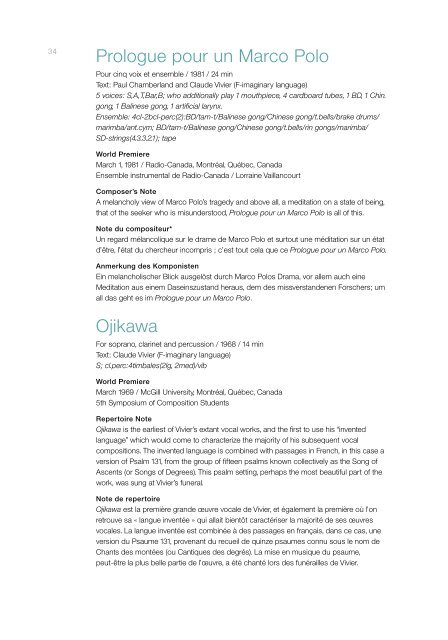1pA9vAA
1pA9vAA
1pA9vAA
You also want an ePaper? Increase the reach of your titles
YUMPU automatically turns print PDFs into web optimized ePapers that Google loves.
34<br />
Prologue pour un Marco Polo<br />
Pour cinq voix et ensemble / 1981 / 24 min<br />
Text: Paul Chamberland and Claude Vivier (F-imaginary language)<br />
5 voices: S,A,T,Bar,B; who additionally play 1 mouthpiece, 4 cardboard tubes, 1 BD, 1 Chin.<br />
gong, 1 Balinese gong, 1 artificial larynx.<br />
Ensemble: 4cl-2bcl-perc(2):BD/tam-t/Balinese gong/Chinese gong/t.bells/brake drums/<br />
marimba/ant.cym; BD/tam-t/Balinese gong/Chinese gong/t.bells/rin gongs/marimba/<br />
SD-strings(4.3.3.2.1); tape<br />
World Premiere<br />
March 1, 1981 / Radio-Canada, Montréal, Québec, Canada<br />
Ensemble instrumental de Radio-Canada / Lorraine Vaillancourt<br />
Composer’s Note<br />
A melancholy view of Marco Polo’s tragedy and above all, a meditation on a state of being,<br />
that of the seeker who is misunderstood, Prologue pour un Marco Polo is all of this.<br />
Note du compositeur*<br />
Un regard mélancolique sur Ie drame de Marco Polo et surtout une méditation sur un état<br />
d’être, I’état du chercheur incompris ; c’est tout cela que ce Prologue pour un Marco Polo.<br />
Anmerkung des Komponisten<br />
Ein melancholischer Blick ausgelöst durch Marco Polos Drama, vor allem auch eine<br />
Meditation aus einem Daseinszustand heraus, dem des missverstandenen Forschers; um<br />
all das geht es im Prologue pour un Marco Polo.<br />
Ojikawa<br />
For soprano, clarinet and percussion / 1968 / 14 min<br />
Text: Claude Vivier (F-imaginary language)<br />
S; cl.perc:4timbales(2lg, 2med)/vib<br />
World Premiere<br />
March 1969 / McGill University, Montréal, Québec, Canada<br />
5th Symposium of Composition Students<br />
Repertoire Note<br />
Ojikawa is the earliest of Vivier’s extant vocal works, and the first to use his “invented<br />
language” which would come to characterize the majority of his subsequent vocal<br />
compositions. The invented language is combined with passages in French, in this case a<br />
version of Psalm 131, from the group of fifteen psalms known collectively as the Song of<br />
Ascents (or Songs of Degrees). This psalm setting, perhaps the most beautiful part of the<br />
work, was sung at Vivier’s funeral.<br />
Note de repertoire<br />
Ojikawa est la première grande œuvre vocale de Vivier, et également la première où l’on<br />
retrouve sa « langue inventée » qui allait bientôt caractériser la majorité de ses œuvres<br />
vocales. La langue inventée est combinée à des passages en français, dans ce cas, une<br />
version du Psaume 131, provenant du recueil de quinze psaumes connu sous le nom de<br />
Chants des montées (ou Cantiques des degrés). La mise en musique du psaume,<br />
peut-être la plus belle partie de l’œuvre, a été chanté lors des funérailles de Vivier.


